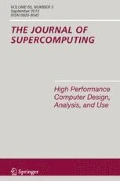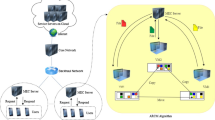Abstract
Cloud-edge collaboration architecture, which combines edge processing and centralized cloud processing, is suitable for placement and caching of streaming media. A cache-aware scheduling model based on neighborhood search is proposed. The model is divided into four sub-problems: job classification, node resource allocation, node clustering, and cache-aware job scheduling. Firstly, jobs are categorized into three categories, and then different resources are allocated to nodes according to different job execution conditions. Secondly, the nodes with similar capabilities are clustered, and the jobs are cached by delay-waiting. For jobs that do not satisfy the data locality, the jobs are scheduled to the nodes with similar capabilities according to the neighborhood search results. Meanwhile, a cache-aware scheduling algorithm based on neighborhood search is proposed. Experiments show that the proposed algorithm can effectively minimize the delay of content transmission and the cost of content placement, the job execution time is shortened and the processing capacity of the cloud data center is improved.










Similar content being viewed by others
References
Gao Z et al (2019) A light-weight trust mechanism for cloud-edge collaboration framework. In: 2019 IEEE 27th International Conference on Network Protocols (ICNP), Chicago. IEEE, pp 1–6
Zhang H, Chen S, Zou P, Xiong G, Zhao H, Zhang Y (2019) Research and application of industrial equipment management service system based on cloud-edge collaboration. In: 2019 Chinese Automation Congress (CAC), Hangzhou. IEEE, pp 5451–5456
Hao Y, Jiang Y, Chen T, Cao D, Chen M (2019) iTaskOffloading: intelligent task offloading for a cloud-edge collaborative system. IEEE Netw 33(5):82–88
Liang W, Huang J (2018) Research on streaming media adaptive congestion control technology. In: 2018 International Conference on Sensor Networks and Signal Processing (SNSP), Xi’an. IEEE, pp 482–485
Cho J, Ko H, Ko I (2016) Adaptive service selection according to the service density in multiple Qos aspects. IEEE Trans Serv Comput 9(6):883–894
Keshanchi B, Souri A, Navimipour NJ (2017) An improved genetic algorithm for task scheduling in the cloud environments using the priority queues: formal verification, simulation, and statistical testing. J Syst Softw 124(2):1–21
Chen H, Zhu X, Liu G et al (2018) Uncertainty-aware online scheduling for real-time workflows in cloud service environment. IEEE Trans Serv Comput. https://doi.org/10.1109/TSC.2018.2866421
Zhang PY, Zhou MC (2018) Dynamic cloud task scheduling based on a two-stage strategy. IEEE Trans Autom Sci Eng 15(2):772–783
Chen CH, Lin JW, Kuo SY (2018) MapReduce scheduling for deadline-constrained jobs in heterogeneous cloud computing systems. IEEE Trans Cloud Comput 6(1):127–140
Ahani G, Yuan D (2020) Optimal scheduling of content caching subject to deadline. IEEE Open J Commun Soc 1:293–307
Kang L, Tang B, Zhang L, Tang L (2019) Mobility-aware and data caching-based task scheduling strategy in mobile edge computing. In: 2019 IEEE Intl Conf on Parallel & Distributed Processing with Applications, Big Data & Cloud Computing, Sustainable Computing & Communications, Social Computing & Networking (ISPA/BDCloud/SocialCom/SustainCom), Xiamen, pp 1071–1077
Akhavanbitaghsir S, Khonsari A (2018) Cooperative caching for content dissemination in vehicular networks. Int J Commun Syst 31(3):1–22
Gopalan NP, Suresh S (2015) Modified delay scheduling: a heuristic approach for hadoop scheduling to improve fairness and response time. Parallel Process Lett 25(04):1550–1559
Lim B, Kim JW, Chung YD (2017) CATS: cache-aware task scheduling for hadoop-based systems. Cluster Comput 20(1):1–15
Ying C, Sun L, Chong H et al (2018) Improved side information generation algorithm based on naive bayesian theory for distributed video coding. IET Image Process 12(3):354–360
Mathiya BJ, Desai VL (2016) Apache Hadoop Yarn MapReduce job classification based on cpu utilization and performance evaluation on multi-cluster heterogeneous environment. In: Proceedings of 9th International Conference on ICT for Sustainable Development. Springer, Singapore, pp 35–44
Zhang X, Hu B, Jiang J (2014) An optimized algorithm for reduce task scheduling. J Comput 9(4):794–802
Mccuaig W, Shepherd B (2010) Domination in graphs with minimum degree two. J Graph Theory 13(6):749–762
Alibaba cloud. IT services. [2020-1-2]. https://www.aliyun.com/ysc/1895756.html
Yu H, Zheng D, Zhao BY et al (2006) Understanding user behavior in large-scale video-on-demand systems. ACM SIGOPS Operat Syst Rev 40(4):333–344
Online Github Google. Youtube-8m. [2019-07-01]. https://github.com/google/youtube-8m
Online Github Intel-Hadoop. HiBench. [2019-07-1]. https://github.com/intel-Hadoop/HiBench
Chunlin Li, Hezhi Sun, Chen Yi, Youlong Luo (2019) Edge cloud resource expansion and shrinkage based on workload for minimizing the cost. Future Gener Comput Syst 101:327–340
Acknowledgements
The work was supported by Open Fund Project of Key Laboratory of Modern Measurement and Control Technology, Ministry of Education, Beijing Information Science & Technology University (KF20201123205), Application Foundation Frontier Project of Wuhan (No. 2018010401011290). Any opinions, findings, and conclusions are those of the authors and do not necessarily reflect the views of the above agencies.
Author information
Authors and Affiliations
Corresponding author
Additional information
Publisher's Note
Springer Nature remains neutral with regard to jurisdictional claims in published maps and institutional affiliations.
Rights and permissions
About this article
Cite this article
Li, C., Zhang, Y. & Luo, Y. Neighborhood search-based job scheduling for IoT big data real-time processing in distributed edge-cloud computing environment. J Supercomput 77, 1853–1878 (2021). https://doi.org/10.1007/s11227-020-03343-6
Published:
Issue Date:
DOI: https://doi.org/10.1007/s11227-020-03343-6




